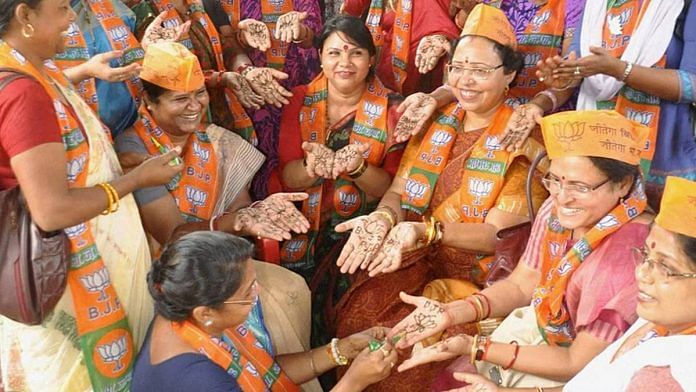The controversy started due to an otherwise regular dinner invitation from the Rashtrapati Bhavan. The invitation to a G20 dinner had a twist — it read President of ‘Bharat’ instead of India, setting off rumours about a proposed change in the name of the country. Politicians, celebrities, and civilians started hotly debating the issue.
But here’s one reason why the controversy should never have emerged: Article 1 of the Constitution reads “India, that is Bharat”. We have seen hundreds of such invitations from the President of India. One from the President of ‘Bharat’ should be just fine. After all, both are the same person.
But politics isn’t so linear and simple.
I won’t delve into whether it’s right or wrong to replace ‘India’ with ‘Bharat’; many analysts are already doing it.
Rather, I observe a tectonic shift in Indian politics that’s giving rise to such actions and debates. That shift is about the advent of the subaltern or the so-called aam aadmi in Delhi’s political power structure. These new political elites are unsophisticated, don’t speak chaste English or use spoons and forks to eat or express any appreciation for the Mozarts, Godards, and Derridas of the world.
I name this transition as a shift from ‘Doon Schools and St. Stephen’s to Chhangamal Inter Colleges’. The latter is any other high school or college in India where children belonging to ordinary backgrounds come to study or just spend some time outdoors. Chhangamal Inter College was immortalised by one of the most popular novelists in Hindi, Sri Lal Sukla, in his 1968 novel Raag Darbari. The book was adapted into a popular TV serial and telecast on Doordarshan, the sole disseminator of mass entertainment in the 1980s. That generation would perhaps be familiar with the trope.
Also read: Three elements that boost PM Modi’s image on TV, in newspapers
‘Chhangamals’ in political corridors
Chhangamal was not a good college at all.
Much like most colleges in the hinterland. There is nothing to celebrate about these decadent and worthless institutions — government after government has ignored the poor quality of education in these colleges. They are spread all across North India, and nobody wants to study here or even go to the premises. But for most Indians, it is the only choice. I, too, have attended a Chhangamal college.
Interestingly, the Indian political corridors at this juncture of our democracy are full of leaders who are products of such institutions. Rahul Gandhi once told me that “the Congress parliamentarians are mostly elites and highly educated, but when I see the BJP parliamentarians, they are so diverse and from such humble backgrounds”. He was not boasting — his tone was laced with lament and deep concern. The Congress leader can’t do much as the party has had a legacy of elite leadership from the time of its inception. Two classes dominated the Congress leadership in the early years and even after Independence: zamindars and advocates. The composition of the elected leaders of the Congress has changed a lot since then, but it is still an elite organisation in terms of party structure.
Also read: Modi is following the 2014 script in criticising INDIA alliance. There’s just one twist
Modi’s charisma compensates
Regional parties, though, have been able to adopt subaltern leadership. Before the 1980s, the Bharatiya Jana Sangh/Bharatiya Janata Party (BJP) was also like a regional party. You can smell sweat in BJP parliamentary party meetings.
These politicians, led by another non-Stephanian leader, are leading the charge. They may be lacking in, to some extent, traditional and legal-rational authority, to borrow from the Weberian methodology.
But to compensate for these inadequacies, the party leadership has an ample amount of charismatic authority — Prime Minister Narendra Modi has brought what LK Advani, Atal Bihari Vajpayee, and MM Joshi lacked.
To tackle the lack of legal-rational authority, in particular, the government depends on bureaucrats and experts. Arun Jaitley was a prominent leader of the party until a few years ago, and now, the dispensation is banking on the likes of S Jaishankars and Nirmala Sitharamans. The BJP has appointed many consultants and experts in the ministries to fill the gap. Buoyed by the immense charisma of Modi, the BJP is managing this mismatch to some extent.
I am not judging or adding any value to this way of governance – it can be either good or bad. How can we forget that the wisest team of the Nehruvian era and socialist period delivered hardly 2 per cent year-on-year GDP growth and a humiliating defeat in 1962?
We are certainly going to see more and more ‘Bharat’ in many arenas. The Modi government isn’t going to bring an amendment to delete the word ‘India’ from the Constitution.
It is not even required.
Dilip Mandal is the former managing editor of India Today Hindi Magazine, and has authored books on media and sociology. He tweets @Profdilipmandal. Views are personal.
(Edited by Humra Laeeq)



